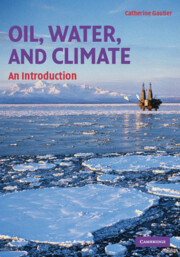Book contents
- Frontmatter
- Contents
- Foreword
- Introduction
- 1 Overview
- 2 Carbon Dioxide Emissions, Global Warming, and Water Resources
- 3 Population, Environmental Impacts, and Climate Change
- 4 Carbon Cycle and the Human Impact
- 5 Peak Oil, Energy, Water, and Climate
- 6 Oil Consumption and CO2 Emissions from Transportation
- 7 Oil, Economy, Power, and Conflicts
- 8 Energy Alternatives and Their Connection to Water and Climate
- 9 The Water Cycle and Global Warming
- 10 Fresh Water Availability, Sanitation Deficit, and Water Usage: Connection to Energy and Global Warming
- 11 Rivers, Lakes, Aquifers, and Dams: Relation to Energy and Climate
- 12 Water Contamination, Energy, and Climate
- 13 Geopolitics of Water and the International Situation
- 14 Water Alternatives
- 15 Global Climate Change: Observations, Modeling, and Predictions
- 16 Energy and Water Challenges and Solutions in a Changing Climate Framework: Commonality, Differences, and Connections
- References
- Index
5 - Peak Oil, Energy, Water, and Climate
Published online by Cambridge University Press: 05 September 2012
- Frontmatter
- Contents
- Foreword
- Introduction
- 1 Overview
- 2 Carbon Dioxide Emissions, Global Warming, and Water Resources
- 3 Population, Environmental Impacts, and Climate Change
- 4 Carbon Cycle and the Human Impact
- 5 Peak Oil, Energy, Water, and Climate
- 6 Oil Consumption and CO2 Emissions from Transportation
- 7 Oil, Economy, Power, and Conflicts
- 8 Energy Alternatives and Their Connection to Water and Climate
- 9 The Water Cycle and Global Warming
- 10 Fresh Water Availability, Sanitation Deficit, and Water Usage: Connection to Energy and Global Warming
- 11 Rivers, Lakes, Aquifers, and Dams: Relation to Energy and Climate
- 12 Water Contamination, Energy, and Climate
- 13 Geopolitics of Water and the International Situation
- 14 Water Alternatives
- 15 Global Climate Change: Observations, Modeling, and Predictions
- 16 Energy and Water Challenges and Solutions in a Changing Climate Framework: Commonality, Differences, and Connections
- References
- Index
Summary
Peak oil has several possible consequences on energy choices both now and in the future. As oil production decreases in the relatively near future, its impact on climate will be reduced, although there will be potential impacts on climate change resulting from the timing of peak oil. The decline of the global oil supply and the consequent increasing cost of oil products mean that a country's abilities to deal with the effects of climate change will be reduced. Oil production, refining, transportation, and burning are all energy and water intensive – in turn significantly affecting climate.
Introduction
Given that petroleum is a finite, nonrenewable resource, it is inevitable that the worldwide production of oil will eventually reach a peak. World demand for oil currently totals 84 million barrels per day and is growing at a rate of just over 2% a year (Energy Information Administration, 2006a). This growth is not expected to abate in the near future as the economies of developing countries are rapidly expanding, and developed countries like the United States have limited conservation awareness. If countries such as China and India, in which automobile use and factories are growing vigorously, start consuming oil at just one-half of current U.S. per capita levels, global demand would instantly jump 96%. According to the U.S. Energy Information Administration, global demand is predicted to reach 120 million barrels per day by 2030.
- Type
- Chapter
- Information
- Oil, Water, and ClimateAn Introduction, pp. 81 - 99Publisher: Cambridge University PressPrint publication year: 2008



